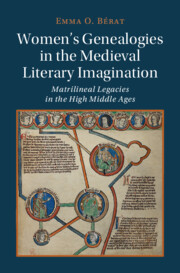 Women's Genealogies in the Medieval Literary Imagination
Women's Genealogies in the Medieval Literary Imagination Royal Genealogical Diagrams and Trevet’s Les Cronicles
Published online by Cambridge University Press: 14 March 2024
The mobility of elite secular women due to marriage, exile, or ambition is often a key feature of genealogical narratives in medieval chronicles and genealogical rolls. The thirteenth and fourteenth centuries saw a particular literary interest in the political consequences and legacies attached to women’s movements, evinced by the prevalence of mobile female founders, such as Albina, Inge, and Margaret of Scotland. This chapter examines how transregional genealogies are constructed in the relationship between text and diagram in works associated with Queen Eleanor of Provence; her mother, Beatrice of Savoy; and her granddaughter Mary of Woodstock. It focuses first on female ancestors and strands of matrilineage in royal genealogical rolls, including the prominent ribbon between Margaret of Scotland and Edith/Matilda. It then turns to Nicolas Trevet’s little-studied Les Cronicles, dedicated to Mary, to discuss an unusual story of Margaret of Scotland’s mother, Agatha of Hungry, accompanied by a matrilineal diagram.
To save this book to your Kindle, first ensure [email protected] is added to your Approved Personal Document E-mail List under your Personal Document Settings on the Manage Your Content and Devices page of your Amazon account. Then enter the ‘name’ part of your Kindle email address below. Find out more about saving to your Kindle.
Note you can select to save to either the @free.kindle.com or @kindle.com variations. ‘@free.kindle.com’ emails are free but can only be saved to your device when it is connected to wi-fi. ‘@kindle.com’ emails can be delivered even when you are not connected to wi-fi, but note that service fees apply.
Find out more about the Kindle Personal Document Service.
To save content items to your account, please confirm that you agree to abide by our usage policies. If this is the first time you use this feature, you will be asked to authorise Cambridge Core to connect with your account. Find out more about saving content to Dropbox.
To save content items to your account, please confirm that you agree to abide by our usage policies. If this is the first time you use this feature, you will be asked to authorise Cambridge Core to connect with your account. Find out more about saving content to Google Drive.